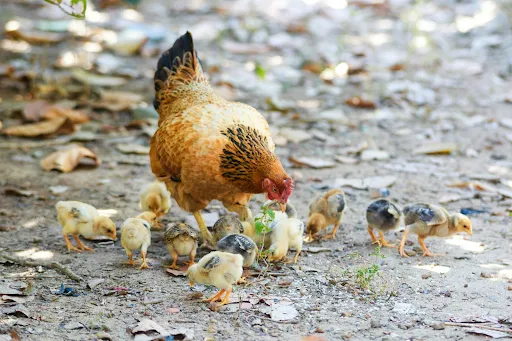Introduction
Hens are one of the most common and important domesticated animals in the world. Known for their egg-laying ability, social nature, and adaptability, hens play a significant role in backyard farming, commercial poultry production, and even as pets. In this article, we’ll explore everything you need to know about hens — from their biology and behavior to popular breeds and care requirements.
What is a Hen?
A hen is a mature female chicken, typically over one year old. Hens are primarily known for laying eggs and are distinct from roosters, the male chickens. The word "chicken" refers to the species in general, while "hen" specifically refers to the adult female.
Biological Characteristics of Hens
Hens are small, feathered birds with strong legs, a beak, and a comb on top of their heads. Here are some key characteristics:
Lifespan: Typically 5–10 years, depending on the breed and care.
Size: Hens usually weigh between 4 to 7 pounds.
Egg Production: Most hens begin laying eggs around 5 to 6 months of age and can lay 250–300 eggs per year.
Diet: Omnivores, they eat grains, seeds, insects, and kitchen scraps.
Behavior: Social animals that prefer to live in flocks and establish a pecking order.
Popular Hen Breeds
There are hundreds of chicken breeds worldwide, but some are especially popular due to their egg-laying capacity, temperament, or appearance. Here are a few:
Rhode Island Red
Excellent egg layers.
Hardy and adaptable.
Lay brown eggs.
Leghorn
Known for high egg production.
Active and energetic.
Lay white eggs.
Plymouth Rock
Friendly and good for families.
Dual-purpose (meat and eggs).
Lay brown eggs.
Orpington
Calm and gentle.
Good layers and meat producers.
Come in various colors like buff, black, and blue.
Silkie
Unique appearance with fluffy feathers.
More ornamental or pet than productive.
Known for broodiness and parenting skills.
Understanding Hen Behavior
Hens are intelligent birds with complex behaviors. Understanding them helps in proper care and management.
Pecking Order: Hens establish a social hierarchy, which determines access to food and space.
Dust Bathing: Hens roll in the dirt to clean their feathers and remove parasites.
Broodiness: Some hens may sit on eggs for extended periods to hatch them, even if the eggs are unfertilized.
Vocalization: Hens use different sounds to communicate. Clucking often indicates contentment, while squawking may signal distress.
Hen Housing: The Chicken Coop
Providing proper housing is essential for the health and productivity of hens. A good chicken coop should include:
Shelter: Protection from weather and predators.
Ventilation: To prevent respiratory issues.
Roosting Bars: Where hens sleep at night.
Nesting Boxes: Comfortable spots for laying eggs.
Space Requirements: At least 2–3 square feet per hen inside the coop and 8–10 square feet in an outdoor run.
Feeding and Nutrition
A balanced diet ensures healthy hens and consistent egg production.
Commercial Feed: Layer feed with 16–18% protein is ideal.
Calcium Source: Crushed oyster shells or eggshells help strengthen eggs.
Fresh Water: Always provide clean water.
Treats: Fruits, vegetables, and grains can be given occasionally but should not exceed 10% of their diet.
Common Health Issues in Hens
Just like any animal, hens can suffer from health problems. Regular monitoring and care can prevent most issues.
Mites and Lice
Signs: Feather loss, irritation, reduced egg production.
Solution: Dusting with diatomaceous earth or poultry-safe insecticides.
Respiratory Infections
Signs: Sneezing, coughing, nasal discharge.
Solution: Isolate affected birds and consult a vet.
Egg Binding
A condition where an egg gets stuck inside the hen.
Requires immediate veterinary attention.
Worms
Internal parasites can affect growth and egg-laying.
Deworming is essential every few months.
Benefits of Keeping Hens
Keeping hens comes with several advantages:
Fresh Eggs: Daily access to nutritious, organic eggs.
Pest Control: Hens eat insects, reducing pests in your garden.
Fertilizer: Their droppings are excellent for compost and soil.
Companionship: Hens can be affectionate and fun to watch.
Legal Considerations and Urban Chicken Keeping
Before starting a backyard flock, check local laws and regulations:
Some cities require permits.
There may be limits on the number of hens.
Roosters may be prohibited due to noise concerns.
Hens as Pets
More people are keeping hens as pets due to their friendly nature. Some even train them to respond to their names or perform simple tricks. Breeds like Silkies and Orpingtons are especially popular as pet hens because of their gentle temperament.
Conclusion
Hens are fascinating creatures that offer a range of benefits, from egg production to companionship. Whether you’re a seasoned farmer or a beginner looking to start a backyard flock, understanding the basics of hen care, behavior, and breeds can lead to a rewarding experience. With proper housing, nutrition, and attention, hens can live healthy lives while providing you with fresh eggs and endless entertainment.

Comments
Post a Comment